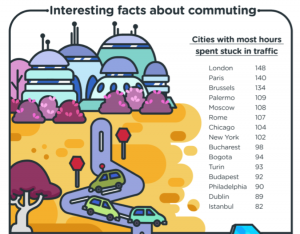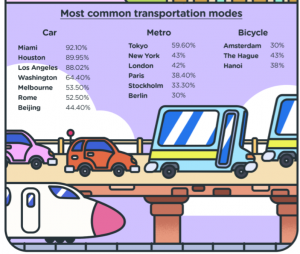Commuting to work
 Starting Point. Discuss the questions below.
Starting Point. Discuss the questions below.
How do you commute to work?
Do you like commuting? Why (not)?
How can you make the most of your commuting time?
Think of a list of disadvantages and problems you can experience while commuting. Are there any possible solutions or ways to mitigate them?


Extra Info
Focus on Vocabulary. Explain the meaning of the words below.
Focus on Comprehension. Answer the questions below about the video.
Focus on Listening. Watch the video. Read the transcript below if necessary.
Answers
Correct answers:
1. The average American commute time has been increasing over the last few decades.
2. Long commutes have been linked to obesity, stress, anxiety, depression, higher blood pressure, higher divorce rates, neck and back problems, and shorter lifespans.
3. People who walk, bike, or take a train have higher life satisfaction according to a Canadian study.
4. Driving alone for long periods can lead to an inactive lifestyle, which has negative effects on both mental and physical health.
5. Public transit commuters tend to be slightly healthier and more satisfied with life, but they often resent timetables and experience stressful situations.
6. Some people view commuting as a source of stress because of factors like transfers, delays, cancellations, and the time it takes away from other activities.
7. The change in communications has made commuting an extension of the workday or an opportunity to engage in activities that couldn’t be done otherwise.
8. In the gig economy, having a home accessible to transportation is more important than living close to the workplace.
9. Commuting is not considered the best way to spend a significant amount of time.
10. Coming home after a long commute can be a relief and a way to unwind from the day.
Transcript

